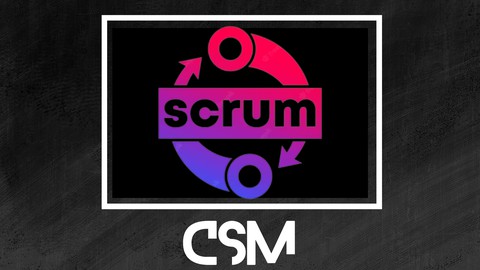
Project Management Prep: 1400 Questions& Explanation
Project Management Prep: 1400 Questions& Explanation, available at $19.99, has an average rating of 5, 6 quizzes, based on 1 reviews, and has 1 subscribers.
You will learn about Describe the origins and evolution of Scrum and its relevance in modern project management. Differentiate between traditional project management methodologies and the Scrum approach. Identify the core values and principles that guide Scrum implementation. Explain the roles, responsibilities, and interactions of the Scrum Team, Product Owner, Scrum Master, and Development Team. Outline the components of the Scrum framework: Sprints, Sprint Planning, Daily Scrum, Sprint Review, and Sprint Retrospective. Describe the purpose and benefits of time-boxed iterations (Sprints) in Scrum. Define the key artifacts of Scrum: Product Backlog, Sprint Backlog, and Increment. Demonstrate an understanding of how the Scrum events promote transparency, inspection, and adaptation. Analyze the responsibilities and expectations of the Product Owner, including managing the Product Backlog. Examine the role of the Scrum Master in facilitating the Scrum process and removing impediments. Describe the self-organizing nature of Development Teams and their responsibilities in delivering Increments. Explore the collaboration and communication dynamics among Scrum Team members and stakeholders. Discuss the importance of cross-functional teams and how they contribute to successful Scrum implementation. Define the purpose and structure of the Product Backlog, including creating and refining items. Explain how to prioritize items in the Product Backlog based on value, risk, and dependencies. Describe the process of creating a Sprint Goal and selecting items from the Product Backlog for the Sprint. Demonstrate how the Sprint Backlog is created, managed, and adjusted throughout the Sprint. Explore techniques for effective Sprint Planning, including estimating effort and breaking down tasks. Describe the purpose of the Daily Scrum and how it promotes synchronization and collaboration within the Development Team. Explain the benefits of conducting a Sprint Review and obtaining feedback from stakeholders. Discuss the importance of continuous improvement through Sprint Retrospectives and implementing actionable changes. Analyze the role of metrics and reporting in Scrum, and how they support transparency and informed decision-making. Identify common challenges and misconceptions when implementing Scrum in organizations. Explore the concept of "Scrum at Scale" and its relevance in complex enterprise environments. Analyze the impact of organizational culture and change management when adopting Scrum. By the end of this course, participants should have a solid understanding of the Scrum framework, its principles, roles, artifacts, and practices. Should also be able to apply Scrum concepts to their projects, foster collaboration within their teams,and navigate potential challenges when implementing Scrum Define Agile principles and explain how Scrum fits within the Agile framework. This course is ideal for individuals who are Professionals seeking to enhance their skills in Agile project management. or Individuals new to Scrum and Agile methodologies. or Project managers, team leads, developers, testers, and business analysts. It is particularly useful for Professionals seeking to enhance their skills in Agile project management. or Individuals new to Scrum and Agile methodologies. or Project managers, team leads, developers, testers, and business analysts.
Enroll now: Project Management Prep: 1400 Questions& Explanation
Summary
Title: Project Management Prep: 1400 Questions& Explanation
Price: $19.99
Average Rating: 5
Number of Quizzes: 6
Number of Published Quizzes: 6
Number of Curriculum Items: 6
Number of Published Curriculum Objects: 6
Number of Practice Tests: 6
Number of Published Practice Tests: 6
Original Price: $19.99
Quality Status: approved
Status: Live
What You Will Learn
- Describe the origins and evolution of Scrum and its relevance in modern project management.
- Differentiate between traditional project management methodologies and the Scrum approach.
- Identify the core values and principles that guide Scrum implementation.
- Explain the roles, responsibilities, and interactions of the Scrum Team, Product Owner, Scrum Master, and Development Team.
- Outline the components of the Scrum framework: Sprints, Sprint Planning, Daily Scrum, Sprint Review, and Sprint Retrospective.
- Describe the purpose and benefits of time-boxed iterations (Sprints) in Scrum.
- Define the key artifacts of Scrum: Product Backlog, Sprint Backlog, and Increment.
- Demonstrate an understanding of how the Scrum events promote transparency, inspection, and adaptation.
- Analyze the responsibilities and expectations of the Product Owner, including managing the Product Backlog.
- Examine the role of the Scrum Master in facilitating the Scrum process and removing impediments.
- Describe the self-organizing nature of Development Teams and their responsibilities in delivering Increments.
- Explore the collaboration and communication dynamics among Scrum Team members and stakeholders.
- Discuss the importance of cross-functional teams and how they contribute to successful Scrum implementation.
- Define the purpose and structure of the Product Backlog, including creating and refining items.
- Explain how to prioritize items in the Product Backlog based on value, risk, and dependencies.
- Describe the process of creating a Sprint Goal and selecting items from the Product Backlog for the Sprint.
- Demonstrate how the Sprint Backlog is created, managed, and adjusted throughout the Sprint.
- Explore techniques for effective Sprint Planning, including estimating effort and breaking down tasks.
- Describe the purpose of the Daily Scrum and how it promotes synchronization and collaboration within the Development Team.
- Explain the benefits of conducting a Sprint Review and obtaining feedback from stakeholders.
- Discuss the importance of continuous improvement through Sprint Retrospectives and implementing actionable changes.
- Analyze the role of metrics and reporting in Scrum, and how they support transparency and informed decision-making.
- Identify common challenges and misconceptions when implementing Scrum in organizations.
- Explore the concept of "Scrum at Scale" and its relevance in complex enterprise environments.
- Analyze the impact of organizational culture and change management when adopting Scrum.
- By the end of this course, participants should have a solid understanding of the Scrum framework, its principles, roles, artifacts, and practices.
- Should also be able to apply Scrum concepts to their projects, foster collaboration within their teams,and navigate potential challenges when implementing Scrum
- Define Agile principles and explain how Scrum fits within the Agile framework.
Who Should Attend
- Professionals seeking to enhance their skills in Agile project management.
- Individuals new to Scrum and Agile methodologies.
- Project managers, team leads, developers, testers, and business analysts.
Target Audiences
- Professionals seeking to enhance their skills in Agile project management.
- Individuals new to Scrum and Agile methodologies.
- Project managers, team leads, developers, testers, and business analysts.
This course includes:
-
6 Practice Tests
-
1400+ questions in total
-
Multiple choice format questions
-
Multiple select format questions
-
True or False format questions
-
Each question includes a detailed explanation
Embark on a transformative journey into the heart of Agile project management with our online course, “Mastering Scrum Fundamentals: Agile Project Management for Success.”You’ll delve into the essential principles, roles, ceremonies, and artifacts of the Scrum framework.
Whether you’re a newcomer eager to explore the world of Agile or a professional seeking to refine your skills, this course offers a dynamic blend of interactive lectures, practical exercises, and real-world case studies. Uncover the power of collaboration, iterative development, and continuous improvement as you learn to navigate the intricacies of Scrum.
Our expertly crafted curriculum ensures you not only understand Scrum’s core concepts but also acquire the practical expertise to implement them across diverse industries. Elevate your project management prowess and gain a certificate that validates your Scrum mastery. Join us to become an Agile leader of tomorrow!
What makes this course unique?
This course is unique because of its emphasis on providing detailed explanations of how the solutions work behind the scenes, so you will not only learn how to implement them, you will actually understand the purpose.
Check your solutions with detailed explanations on the fundamentals of Scrum.
Flexible Learning: Our online platform allows you to learn at your own pace and convenience. Access course materials, lectures, and assignments from anywhere, at any time.
Who Should Attend:
-
Professionals looking to enhance their project management skills with Agile methodologies
-
Beginners seeking an introduction to Scrum and Agile principles
-
Project managers, team leads, developers, testers, and business analysts
-
Anyone aiming to foster collaboration, adaptability, and iterative development within their teams
Certification:
Upon successful completion of the course, you will receive a certificate that validates your mastery of Scrum fundamentals, boosting your credibility in the field of Agile project management.
You will also have lifetime access to the course.
Are you ready to embark on a transformative journey that will reshape the way you approach projects? Join us in “Mastering Scrum Fundamentals: Agile Project Management for Success” and unlock your potential for excellence in Agile project delivery. Enroll now and take the first step toward becoming a Scrum expert!
Course Curriculum
Instructors
-
MCQ Minds
Master Interview Questions Answers with MCQ Minds
Rating Distribution
- 1 stars: 0 votes
- 2 stars: 0 votes
- 3 stars: 0 votes
- 4 stars: 0 votes
- 5 stars: 1 votes
Frequently Asked Questions
How long do I have access to the course materials?
You can view and review the lecture materials indefinitely, like an on-demand channel.
Can I take my courses with me wherever I go?
Definitely! If you have an internet connection, courses on Udemy are available on any device at any time. If you don’t have an internet connection, some instructors also let their students download course lectures. That’s up to the instructor though, so make sure you get on their good side!
You may also like
- Top 10 Emotional Intelligence Courses to Learn in December 2024
- Top 10 Time Management Courses to Learn in December 2024
- Top 10 Remote Work Strategies Courses to Learn in December 2024
- Top 10 Freelancing Courses to Learn in December 2024
- Top 10 E-commerce Strategies Courses to Learn in December 2024
- Top 10 Personal Branding Courses to Learn in December 2024
- Top 10 Stock Market Trading Courses to Learn in December 2024
- Top 10 Real Estate Investing Courses to Learn in December 2024
- Top 10 Financial Technology Courses to Learn in December 2024
- Top 10 Agile Methodologies Courses to Learn in December 2024
- Top 10 Project Management Courses to Learn in December 2024
- Top 10 Leadership Skills Courses to Learn in December 2024
- Top 10 Public Speaking Courses to Learn in December 2024
- Top 10 Affiliate Marketing Courses to Learn in December 2024
- Top 10 Email Marketing Courses to Learn in December 2024
- Top 10 Social Media Management Courses to Learn in December 2024
- Top 10 SEO Optimization Courses to Learn in December 2024
- Top 10 Content Creation Courses to Learn in December 2024
- Top 10 Game Development Courses to Learn in December 2024
- Top 10 Software Testing Courses to Learn in December 2024





















